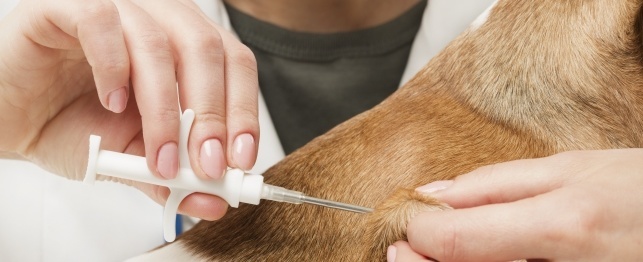There are many dog health problems that could certainly have an impact on labrador retriever training. Indeed, such health conditions could either impede or put a stop to your dog's training progress. Failure to take appropriate preventive measures might result to the progression of serious health problems. As the saying goes, prevention is always better than cure. Sad to say, there are numerous dog diseases that are truly inevitable, particularly those conditions that are brought about by their parents' genes.
Weight issues, obesity
Most big dogs have large appetites; and so, they have the tendency to endure weight problems like obesity. Poor feeding habits and the provision of fattening meals or treats are frequently the reason why big dogs like the labrador retrievers tend to grow bigger than they're designed to. Dog owners should always keep in mind the need for discipline, especially when enforcing a strict diet.
Seek advice from your vet regarding the best kind of diet or the kinds of nutrients needed to boost your labrador's overall health. In this manner, you can avoid coping with weight issues, and avert the occurrence of obesity and its complications. Unsurprisingly, an obese labrador is not that productive and easy to train with. You are less likely to accomplish effective labrador retriever training.
Centroneuclear Myopathy or Hereditary Myopathy of Labrador Retrievers (HMLR)
As the name signifies, this muscle defect is inherited; the affected lab got his disease genes from both his parents in spite of whether they've exhibited some symptoms or not. This condition is often characterized by the deficiency of type II muscle fibers that contributes to the massive reduction in skeletal muscle mass. Symptoms include an abnormal gait and posture in addition to weakness in the muscles that often cause low tolerance to strenuous physical exercises and training.
Now this means that your dog is not suitable for arduous labrador retriever training activities. But, it doesn't necessarily mean that your lab is no longer competent at doing anything. Sadly though, there is no efficient cure for such condition. However, rest and proper means of managing can minimize the pain and it's other symptoms. Keep in mind that cold and stress should be sidestepped as your suffering labrador retriever is very fragile to them.
Exercise Induced Collapse (EIC)
This condition is most widespread in young adult labrador retrievers. This syndrome of exercise intolerance and collapse is inherited or genetic. Many affected dogs are even described as muscular and fit or healthy. And whilst moderate forms of physical exercises can be tolerated by affected labs, it is wise that you be very cautious and heedful when executing your labrador retriever training routines. In this way, you will realize when to stop.
Overexertion and overwhelming excitement often induce weakness in the legs that is then accompanied by collapse. Most affected labradors stay conscious soon after collapsing while others become totally stunned and disoriented. Take note that it's important for you to end any activities upon display of wobbliness or in-coordination. Quite a few dogs have perished during training or exercise, and others while they were resting just after suffering from such condition.

 Canine Epilepsy Diet – What Should Be on The Menu?
Did yo
Canine Epilepsy Diet – What Should Be on The Menu?
Did yo
 Reasons for Euthanizing a Dog
Reasons for Euthanizing a Dog
Reasons
Reasons for Euthanizing a Dog
Reasons for Euthanizing a Dog
Reasons
 Microchipping for Your Dogs Safety
Microchipping for Your Dogs Safety
Microchipping for Your Dogs Safety
Microchipping for Your Dogs Safety
 How to Protect Against Dog Theft
How to Protect Against Dog Theft
How to Protect Against Dog Theft
How to Protect Against Dog Theft
 Cephalexin For Dogs: How it Helps
Cephalexin is one of several antibi
Cephalexin For Dogs: How it Helps
Cephalexin is one of several antibi